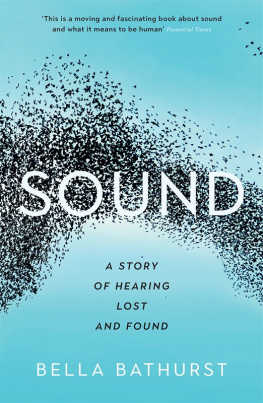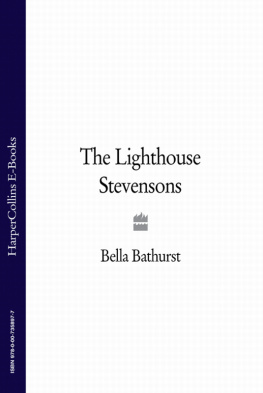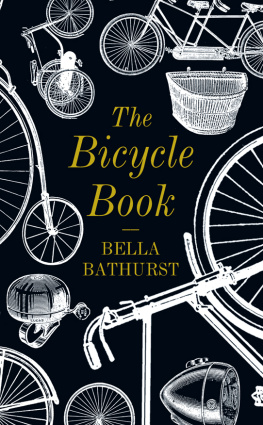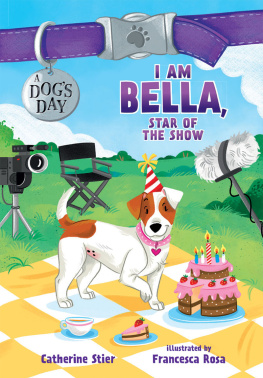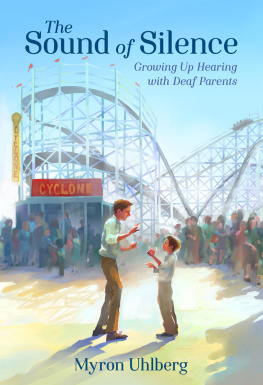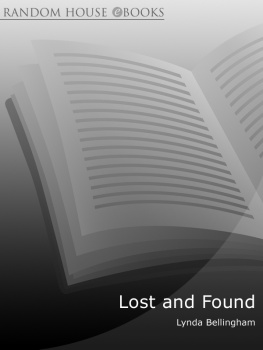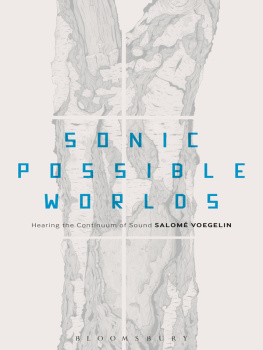Bella Bathurst - Sound: A Story of Hearing Lost and Found
Here you can read online Bella Bathurst - Sound: A Story of Hearing Lost and Found full text of the book (entire story) in english for free. Download pdf and epub, get meaning, cover and reviews about this ebook. year: 2017, publisher: Profile, genre: Detective and thriller. Description of the work, (preface) as well as reviews are available. Best literature library LitArk.com created for fans of good reading and offers a wide selection of genres:
Romance novel
Science fiction
Adventure
Detective
Science
History
Home and family
Prose
Art
Politics
Computer
Non-fiction
Religion
Business
Children
Humor
Choose a favorite category and find really read worthwhile books. Enjoy immersion in the world of imagination, feel the emotions of the characters or learn something new for yourself, make an fascinating discovery.
- Book:Sound: A Story of Hearing Lost and Found
- Author:
- Publisher:Profile
- Genre:
- Year:2017
- Rating:3 / 5
- Favourites:Add to favourites
- Your mark:
- 60
- 1
- 2
- 3
- 4
- 5
Sound: A Story of Hearing Lost and Found: summary, description and annotation
We offer to read an annotation, description, summary or preface (depends on what the author of the book "Sound: A Story of Hearing Lost and Found" wrote himself). If you haven't found the necessary information about the book — write in the comments, we will try to find it.
Sound: A Story of Hearing Lost and Found — read online for free the complete book (whole text) full work
Below is the text of the book, divided by pages. System saving the place of the last page read, allows you to conveniently read the book "Sound: A Story of Hearing Lost and Found" online for free, without having to search again every time where you left off. Put a bookmark, and you can go to the page where you finished reading at any time.
Font size:
Interval:
Bookmark:
Sound
Bella Bathurst is a writer and photojournalist. Her books include The Lighthouse Stevensons which won the 1999 Somerset Maugham Award, The Wreckers, which became a BBC Timewatch documentary, and The Bicycle Book, which was shortlisted for the William Hill Sports Book of the Year 2011.
ALSO BY BELLA BATHURST
The Bicycle Book
The Lighthouse Stevensons
Special
The Wreckers
Sound
Bella Bathurst
Stories of Hearing
Lost
and Found

First published in Great Britain in 2017 by
PROFILE BOOKS LTD
3 Holford Yard
Bevin Way
London
WC1X 9HD
www.profilebooks.com

Published in association with Wellcome Collection
183 Euston Road
London NW1 2BE
www.wellcomecollection.org
Copyright Bella Bathurst, 2017
The author and publisher would like to make clear that some names have been changed in the text to protect privacy.
The moral right of the author has been asserted.
All rights reserved. Without limiting the rights under copyright reserved above, no part of this publication may be reproduced, stored or introduced into a retrieval system, or transmitted, in any form or by any means (electronic, mechanical, photocopying, recording or otherwise), without the prior written permission of both the copyright owner and the publisher of this book.
A CIP catalogue record for this book is available from the British Library.
eISBN 978 1 78283 324 6
For Urile and Marc, with love
In the 1981 census, a return was received from someone who described their profession as sculptor of stone lions. In answer to the supplementary question Describe what your job entails, the responder wrote: I chip away all the stone which is not lion.
Sailing
I TAKE THE TURNING off the main route, slowing to follow the single-track line of tarmac out towards the sea. Its late summer and the verges are thick with bracken and fireweed, their stems knocking at the car as it passes. Over to the north the sky has blackened, banks of cloud massing. Half a week of perfect weather, and it looks as if its going to break now.
Six miles on the track widens. Theres a farm, a scatter of buildings, an office. Beside the verge lie the curvaceous outlines of several upturned canoes with a rack of yellow kayaks poking out of the car park beside it. As I pass the farm a collie comes hurtling out of the yard, racing towards the car. He flings himself at the bonnet and in the instant of his collision I flinch the steering wheel away. His fur flattens against the glass and I feel the thud of his body echo through the metal. A blur of hackles and then hes gone, slid out of view. Oh God, have I run him over? Then hes up again, a snarl of black and white against the closed window. His tail is up and his teeth are bare and theres so much energy in him, so much unleashed delight in his rage. He jolts up, front claws ticking on the glass. I can see the force of each bark shoving his whole body forward: thud, thud, thud. The slower I go, the angrier he gets.
I straighten the steering wheel and drive on, the dog receding in the mirror. Hes running down the track, the tuft of his tail peacocking his achievement. After a few moments he stops and watches the back of me.
Just beyond the farmyard theres a passing place so I pull in and stop the car. I look down at my hands, watching them shake. Its not the dog. It gave me a fright, but dogs love chasing cars and that collie has done it before. It was the fact that I couldnt hear the dog. Nothing. Not a whisper. He was giving it his all, every last atom in him, and none of it reached me. No sound, just a sort of muffled rush, and even that might have been my imagination.
I put my hand up to my right ear and cover the little hole on the right hearing aid. Open, close. Close, open. All working fine and the other one too. The aids are small plastic flesh-grey in-the-ear things designed to fit down the tunnels to my eardrums. At the outer end theres a socket for the battery and a tiny gap for sound to get in. At the inner theres another slot where the processed sound enters my ear. I take them both out and dip my head from side to side, then turn the radio on and off. Theres nothing blocked, nothing out of the ordinary.
I put the aids back in and the world returns. These ones are designed to cope best in indoor environments, places like offices and homes full of double-glazing and other human beings all soaking up sound. The aids dont deal well with big reverberant spaces and they really dont seem to have got the hang of the outdoors at all. Out here the wind works on the aids the same way it does on a phone, drowning voices below a storm of white noise. If I turn my head slightly the noise eases but that probably means turning away from the speaker, and I need to see people properly in order to be able to hear them because half of what Im listening to is the words on their faces. Take away most of the sentence, and I can still see whether its a question or a statement, or pick up enough of the tone to gauge the mood of the speaker. Im looking for physical guides, and half their diction is there in the features the lift of an eyebrow, a hardening tone, the warmth in the eyes.
At this time, in 2004, I am deaf. Not completely deaf, just down to about 30 per cent of normal hearing. I had started to lose my hearing in both ears about seven years ago and it has been declining ever since. I wear hearing aids in both ears and when I take them out, I can hear individual fragments of sound but not really the links between them. Certain words in a sentence or specific sounds are audible, but music is only a beat and a voice is just a chain of broken plosives.
I am here because Im going sailing. My friend Eric has asked me to come and I very much want to do this. But water is not my element. Im mesmerised by it and Im scared of it, and because Im scared of it, I head straight for it. I love sailing the adventure, the pleasure of being with friends. But I hate sailing the cold, the wet, the seasickness, the fear. Im here because I want to push the love in and the fear away, and at that time I believe the best way to deal with fear is to hurl myself head first at the thing which most frightens me. It is a kind of idiot courage, a determination to force myself towards a different shape. I hope if I do the things that scare me for long enough, they will become easier. I want to override the physical facts, and to teach myself a lesson.
The trouble is that water is not like land. Its said that almost all of what we experience as sound is an echo that the conversation you hear when youre sitting in a room with someone is mostly just their voice bouncing off the walls. Outside, at sea, theres very little echo. Still water carries sound beautifully because theres such a big surface area from which it can rebound, but choppy water presents a thousand different points of connection. The only surfaces with a good echo are the ones on the boat itself fibreglass, metal, wood. And when the engine is running it lays a steady thrum over any lower sounds. What that means in practice is that all the sibilants get knocked out of speech: Nyoupuenerou? Ucuthemooinroe? Ilanacoupleougarleae?
The difficulty is that sailing requires a lot of instructions and understanding. In the heat of the moment I cant expect anyone to stop what theyre doing and turn towards me so I know the next couple of days are going to be tricky. If I cant hear something on land its a problem but there are things I can do to improve it. Out here, blanking an instruction or mishearing a command has much bigger consequences.
Next pageFont size:
Interval:
Bookmark:
Similar books «Sound: A Story of Hearing Lost and Found»
Look at similar books to Sound: A Story of Hearing Lost and Found. We have selected literature similar in name and meaning in the hope of providing readers with more options to find new, interesting, not yet read works.
Discussion, reviews of the book Sound: A Story of Hearing Lost and Found and just readers' own opinions. Leave your comments, write what you think about the work, its meaning or the main characters. Specify what exactly you liked and what you didn't like, and why you think so.

